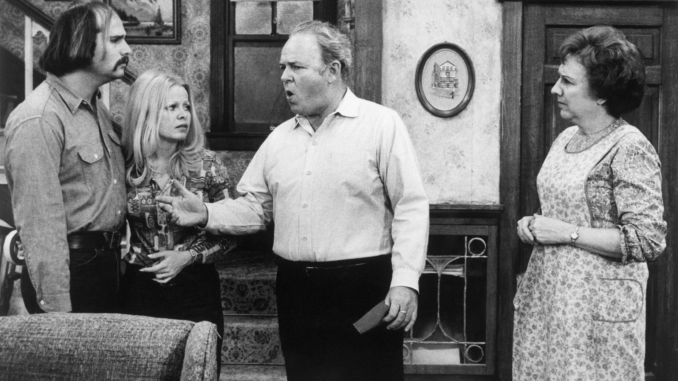
When All in the Family premiered on CBS in January 1971, no one could have predicted that a sitcom would so drastically reshape the American television landscape. But that’s exactly what it did. Bold, funny, controversial, and deeply reflective of its time, All in the Family became more than just a TV show—it became a national conversation.
A Revolutionary Concept in Sitcom History
Created by Norman Lear, All in the Family centered around Archie Bunker, a working-class, conservative, and unapologetically opinionated man living in Queens, New York, with his family. Played by Carroll O’Connor, Archie quickly became one of the most iconic—and divisive—characters on American television.
What set the show apart was its fearless approach to sensitive topics: racism, sexism, homophobia, war, religion, and class conflict. Unlike the feel-good sitcoms of the 1950s and 60s, All in the Family brought real-world issues into the living room and dared its audience to confront them, laugh at them, and sometimes even be uncomfortable.
Breaking Taboos and Starting Conversations
The show’s brilliance lay in its complexity. Archie was bigoted, but also human and occasionally sympathetic. His liberal son-in-law, Michael (nicknamed “Meathead”), often served as a foil to Archie’s outdated views, creating fiery debates that mirrored real-life generational tensions.
For many Americans, these living room battles felt familiar—and that was the point. All in the Family held up a mirror to society, showing viewers the good, the bad, and the ugly of American culture.
Cultural Impact and Legacy
All in the Family quickly rose to become the #1 show on television for five consecutive years (1971–1976). It not only earned dozens of Emmy Awards but also spawned successful spin-offs, including The Jeffersons, Maude, and Good Times—all of which carried forward the show’s spirit of social commentary.
Perhaps its greatest legacy is proving that comedy could do more than entertain—it could challenge, provoke, and create meaningful dialogue.
Controversy and Criticism
The show was not without critics. Some worried that Archie Bunker’s bigotry, even when clearly framed as wrong, might be misunderstood or even embraced by certain viewers. But Norman Lear argued that presenting uncomfortable truths was better than avoiding them altogether—and millions of viewers seemed to agree.
Conclusion: A Sitcom That Shaped a Nation
All in the Family was never just a sitcom. It was a cultural catalyst that redefined what television could say and do. By turning a weekly comedy into a platform for real social issues, it helped shape a generation’s understanding of politics, prejudice, and progress.
More than 50 years later, its influence can still be felt in today’s socially conscious storytelling. In a world that still struggles with many of the same issues, All in the Family reminds us that laughter can also be a tool for change.
